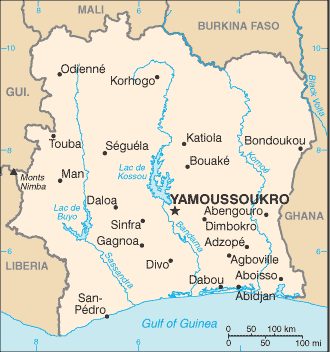Map:

Overview:
Close ties to France since independence in 1960, the development of cocoa production for export, and foreign investment made Cote d'Ivoire one of the most prosperous of the tropical African states, but did not protect it from political turmoil. On 25 December 1999, a military coup - the first ever in Cote d'Ivoire's history - overthrew the government led by President Henri Konan BEDIE. Junta leader Robert GUEI held elections in late 2000, but excluded prominent opposition leader Alassane OUATTARA, blatantly rigged the polling results, and declared himself winner. Popular protest forced GUEI to step aside and brought runner-up Laurent GBAGBO into power. Ivorian dissidents and disaffected members of the military launched a failed coup attempt in September 2002. Rebel forces claimed the northern half of the country and in January 2003 were granted ministerial positions in a unity government under the auspices of the Linas-Marcoussis Peace Accord. President GBAGBO and rebel forces resumed implementation of the peace accord in December 2003 after a three-month stalemate, but issues that sparked the civil war, such as land reform and grounds for nationality remain unresolved. The central government has yet to exert control over the northern regions and tensions remain high between GBAGBO and rebel leaders. Several thousand French and West African troops remain in Cote d'Ivoire to maintain peace and facilitate the disarmament, demobilization, and rehabilitation process.
The People:
Population: 17,298,040
note: estimates for this country explicitly take into account the effects of excess mortality due to AIDS; this can result in lower life expectancy, higher infant mortality and death rates, lower population and growth rates, and changes in the distribution of population by age and sex than would otherwise be expected (July 2005 est.)
Age structure:
0-14 years: 41% (male 3,490,536/female 3,596,208)
15-64 years: 56.3% (male 4,920,726/female 4,820,326)
65 years and over: 2.7% (male 231,514/female 238,730) (2005 est.)
Religions:
Christian 20-30%, Muslim 35-40%, indigenous 25-40% (2001)
note: the majority of foreigners (migratory workers) are Muslim (70%) and Christian (20%)
Government Type:
republic; multiparty presidential regime established 1960
Leader(s) to pray for:
chief of state: President Laurent GBAGBO (since 26 October 2000);
head of government: Prime Minister Seydou DIARRA (since 25 January 2003); note - appointed as transitional Prime Minister by President GBAGBO as part of a French brokered peace plan
Source: The World Factbook
View All Countries